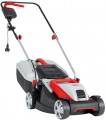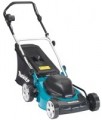Cutting width
The capture width provided by the unit, in other words, the width of the strip of land cultivated in one pass. In fact, this size corresponds to the width of the working nozzle.
The large working width is useful when processing large open spaces, as it allows you to finish the job in a small number of passes. On the other hand, for hard-to-reach places, relatively narrow tools are better suited, able to go where a wider unit will not fit. In addition, the width of the tool directly affects the weight and price.
In general, it makes sense to compare in terms of working width only units of the same type (see above). However, it is worth noting here that trimmers do not differ so much from each other — most models capture from 25 to 45 cm (and a wide processing band is provided by moving the nozzle from side to side). As for the other types, in the most modest models the capture width
does not exceed 40 cm, in the heaviest and most powerful it can be
56 – 60 cm or even
more(in mini tractors — up to 1.5 m).
Max. cutting height
The maximum cutting height that the lawn mower can achieve is the maximum height of grass that can be left after the machine has passed.
This parameter is relevant mainly for those cases when you want to leave the grass on the lawn relatively long. In addition,
lawn mowers with high cutting heights have a wide range of mowing adjustments.
Number of height settings
The number of cutting height settings provided by the lawn mower. The more such settings (with the same adjustment range) — the more accurately you can choose the mowing height. Note that in some robots (see "Type") this number reaches 30 or more with a range of 30 to 60 mm; in other words, you can select the height to the nearest millimetre.
Cutting height adjustment
The cutting height adjustment method provided in the machine.
—
Synchronous. Adjustment carried out "in one movement" — as opposed to the manual described below. In traditional lawn mowers, it is usually carried out by a lever that changes the height of all wheels at the same time; in other units, not the wheels, but the cutting tool itself, can be adjusted in height. Anyway, synchronous adjustment is much more convenient than manual adjustment, and for some devices (for example, robots and riders, see "Type") this is generally the only technically possible option. However, in classic mowers, such a system complicates and increases the cost of construction.
— Manual. The meaning of this type of adjustment depends on the type of device. So, for trimmers, this is almost the only possible way by definition: in them, the cutting height is regulated by how high the operator holds the working nozzle. In lawn mowers, manual adjustment means that you need to separately adjust the height of each axle, and even each individual wheel. Such systems are simpler and cheaper than synchronous systems, but less convenient to use.
Recommended area
The area of the site for which the lawn mower is designed. It cannot be argued that this parameter is critical when choosing a device, these are only manufacturer's recommendations and are very conditional. However, they are more than justified and generally show the available front of work based on the heating of the motor, the capacity of the tank or battery, and other factors that affect the duration of work.
Bag type
A type of bag used in a lawn mower to collect grass clippings.
—
Hard. Bags (containers) made of a hard material, usually plastic. Such a container is more convenient to unload than a soft one, it is more durable and reliable, but it weighs a little more.
—
Soft. The advantages of soft fabric bags are primarily low weight and the ability to fold after hours, which can facilitate storage. In addition, the degree of fullness of such a bag can be controlled by eye without any special indicators. On the other hand, soft bags are very inconvenient to unload.
—
Combined. Bags that combine soft and hard materials in construction; the upper part is usually made solid. This combination makes it easier to unload the bag and at the same time allows it to be rolled up quite compactly for storage.
— Is absent. The absence of a bag is characteristic of some varieties of mowing units — in particular, mowers and trimmers (see "Type"). In classic lawn mowers, it usually means that this model does not involve collecting grass — all cut vegetation remains on the ground. At the same time, most of these models have the function of mulching (see above), however, there are exceptions.
Bag volume
The volume of the grass clipping bag supplied with the lawn mower. Manufacturers select this volume depending on the power, performance and overall level of the unit, however, similar models may differ in this indicator. In such cases, it is worth considering that a larger bag takes longer to fill and needs to be unloaded less often, but it weighs more and takes up more space (even when empty). Mostly the difference in the volume of the bag is 5 liters and there are
lawn mowers for 35,
40,
45,
50, 55,
60,
65,
70 and more liters.
Motor power
Lawnmower engine power expressed in watts. This designation is used absolutely for all electric models (see "Engine type"), and it is also often found in gasoline and diesel units along with horsepower (these units are clearly related, 1 hp is about 735 watts).
In general, the more powerful the engine, the more performant the mower and the better it will cope with heavy work such as cutting thick grass, bushes, etc. On the other hand, high power has a corresponding effect on fuel / electricity consumption, as well as the weight and price of the engine. In addition, note that the power requirements depend on the type of mower itself and its engine (see above for both). For example, for most
robots, the power
does not exceed 500 W — more, taking into account specialization, is not required, besides, otherwise the devices would turn out to be too bulky and heavy. Trimmers and lawn mowers of similar power are only electric, and the power limit for power tools is
2500 – 3000 W when powered from the mains and
1500 – 2000 W for battery models. But in gasoline tools, the minimum power is about
500 – 1000 W for trimmers and
1000 – 1500 W for mowers; the maximum value can exceed
4 kW.
Detailed recommendations for choosing a lawn mower d
...epending on its type and features of the planned work can be found in special sources.Deck material
The material from which the deck is made is a protective casing that covers the cutting tool of a lawn mower or trimmer. In modern mowers there are such options:
— Plastic. The cheapest and at the same time the least durable material.
— Aluminium alloy. The most advanced option: these decks are durable, lightweight and less prone to corrosion, but quite expensive.
— Steel. It has greater strength than aluminium alloy and costs less, but is heavier and more prone to corrosion.

